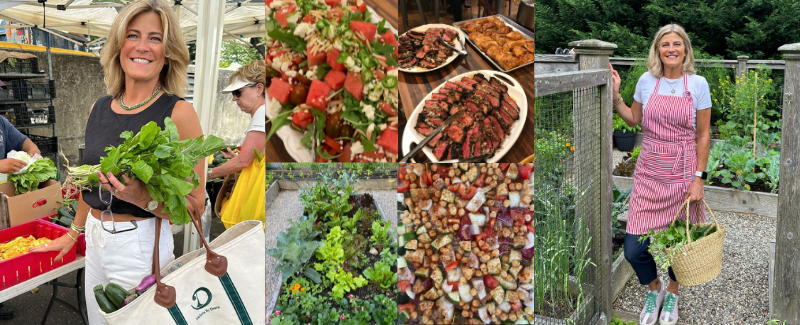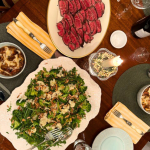
An Interview with Julia Deane
Executive Chef at Culinary Works
Julia Deane recently sat down to discuss her journey as a chef and cooking instructor at Culinary Works. Julia shares her insights on balancing roles as a home chef, mother, wife, and business owner, offering practical advice for women striving to find harmony in their own lives. Through her story, Julia highlights her approach to creating menus for her classes, the essential skills every great cook should strive for, and the importance and joy of sharing meals with loved ones, a philosophy that sets Culinary Works apart from other culinary schools.
Q: Can you share a bit about your journey and what inspired you to learn and teach others how to cook delicious recipes?
A: I prefer the presence of people and feel like there are two routes to go: catering or being an experiential chef/instructor. I feel like inspiring someone is more gratifying and making a difference in someone’s life.
Q: Did you always love to cook? Was it a big part of your childhood?
A: It wasn’t a major part of my childhood. I wasn’t always involved in the kitchen but was always involved in health and fitness and that really ties into the kitchen. I later learned that food could be a conduit for putting that in her life. I’ve also shared some of my family cooking experiences with my mom and my aunt on the website.
Q: How do you balance your roles as a home chef, cooking instructor, mother, wife, and business owner? What tips do you have for other women?
A: Balance is what most people strive for in life in any capacity and it’s not easy to find. Keep your expectations realistic and don’t put up too many roadblocks when it comes to cooking. It doesn’t have to be complicated to be successful.
I don’t cook every night but do most nights and set that time aside, having a schedule. People overthink too much and it becomes a barrier and stops them from becoming more confident in the kitchen. Time management, focus on eating healthy, and have faith and confidence in yourself. Take time and sit down and relax and nourish your body and really focus on that as a form of self-care.
So often, I feel like people aren’t focusing on the act of enjoying their food and having a meaningful conversation and how important it is. Cooking breeds moments of togetherness. It’s a lot of what people lack they need that connection. Set the table with your kids and make it an experience, make them involved.
Q: What’s the same between all your class types, what’s different?
A: The process is the same as how I go about teaching. But the actual group is always different and it depends on how they know each other. For the menus, I try to stick to a more seasonal type of approach. In the seasonal cooking classes when it’s open to the public initially it can be a little bit awkward trying to introduce everyone until they start cooking and then people begin to relax and understand the groove of how the event will flow.
Q: How do you approach creating menus for your cooking classes?
A: It can be quite challenging because I tend to overthink what people would want and sometimes it’s just a matter of preaching to myself and knowing it doesn’t have to be super difficult. A lot of the time it’s about the connection. It’s the little things along the way that are sometimes more valuable than the recipe itself.
Q: What are some of the main culinary skills you try to teach people in your cooking classes?
A: Knife skills, specifically slicing and rough chopping. Proper seasoning, salt, pepper, etc. It’s really the basics that people need a better understanding of. I try to inspire people to get into the kitchen with a burst of confidence.
Q: What are your favorite dishes to teach in your classes, and why?
A: Whatever is the most in season is always the most fun. Sometimes people aren’t aware that cooking seasonally is more nutritious for you. It’s more focused on local and homegrown foods, and it makes you more aware of the season that you’re in and it’s also more flavorful. It’s more nutritiously dense because it didn’t travel as far.
Q: Can you share some of your favorite ingredients to work with and why you love them?
A: Salt! Sometimes that’s all you need to make a dish spectacular. Fresh herbs because they really elevate a dish and take it to the next level. It adds such a boost to the dish from a flavor and fresh perspective as well as some lightness. People always need to use more, you have them, so be more generous. Always be more generous with everything in cooking. Herbs, salt, pepper, everything.
Q: How do you keep the flame of inspiration burning and keep things fresh in the kitchen?
A: Certainly going out to eat at restaurants and traveling makes a difference.
Q: What do you think sets Culinary Works apart from other culinary schools and cooking classes?
A: The environment and the beautiful Deane Kitchens showroom. With the freedom and relaxed atmosphere, the structure is a little more varied based on the group. It’s a boutique business and you can feel comfortable to ask questions.
Q: What has been your favorite cooking experience while on vacation abroad, and why?
A: Tuscany last summer because I had my own kitchen and was able to shop in the local markets and cook on my own. I was also with my family and being with my loved ones just made it even more special.
A: Which country has the best food?
A: Italy…Portugal was also really good too.
Culinary Works isn’t just a place to learn how to cook—it’s a community where Julia inspires people to explore new flavors, create memorable experiences, and rediscover the beauty of a shared meal. Sign up for a cooking class at Culinary Works today.


